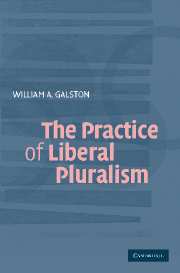Book contents
- Frontmatter
- Contents
- Acknowledgments
- 1 Introduction
- PART I PHILOSOPHICAL FOUNDATIONS OF LIBERAL PLURALISM
- PART II LIBERAL PLURALISM AND PUBLIC ACTION
- PART III POLITICS, MARKETS, AND CIVIC LIFE IN LIBERAL PLURALIST SOCIETIES
- PART IV DEFENDING LIBERAL PLURALISM
- 10 Liberal Pluralism and Liberal Egalitarianism
- 11 Liberal Pluralism Between Monism and Diversity
- 12 Conclusion: Liberal Pluralism at Home and Abroad
- Index
10 - Liberal Pluralism and Liberal Egalitarianism
Published online by Cambridge University Press: 18 December 2009
- Frontmatter
- Contents
- Acknowledgments
- 1 Introduction
- PART I PHILOSOPHICAL FOUNDATIONS OF LIBERAL PLURALISM
- PART II LIBERAL PLURALISM AND PUBLIC ACTION
- PART III POLITICS, MARKETS, AND CIVIC LIFE IN LIBERAL PLURALIST SOCIETIES
- PART IV DEFENDING LIBERAL PLURALISM
- 10 Liberal Pluralism and Liberal Egalitarianism
- 11 Liberal Pluralism Between Monism and Diversity
- 12 Conclusion: Liberal Pluralism at Home and Abroad
- Index
Summary
The politics of liberal pluralism has been questioned from a number of standpoints, liberal egalitarianism prominent among them. In this chapter, I examine and respond to three of liberal pluralism's most important egalitarian critics – Ronald Dworkin, Brian Barry, and Susan Okin.
RONALD DWORKIN
Let me begin by contrasting Ronald Dworkin's latest approach to political philosophy with that of two well-known competitors. (1) In contrast to John Rawls, Dworkin does not treat political philosophy as free-standing, but sees it as grounded in general ethical values, such the structure of good lives and the principles of personal responsibility. (In Rawls's terminology, Dworkin's theory is comprehensive rather than “political.”) The direct appeal to ethical foundations means that Dworkin makes no use of social contract devices. (2) As we have already seen, Dworkin is an ethical monist rather than a pluralist. While theorists working in the tradition of Isaiah Berlin contend that basic goods and values are heterogeneous, incommensurable, and conflicting, Dworkin seeks to dissipate these conflicts and integrate key political values into a harmonized whole. In particular, Dworkin sees no conflict between liberty and equality, rightly understood. If there were such a conflict, liberty would have to give way to equality, which Dworkin understands as the master-value of liberalism, as “sovereign.”
Each of these contrasts raises questions. In one important respect, Dworkin's claim to offer a “comprehensive” as opposed to Rawls-style “political” theory is puzzling. Early on in Sovereign Virtue, he suggests that his thesis concerning equality rests on “more general ethical values” – including the “structure of a good life described in chapter 6.”
- Type
- Chapter
- Information
- The Practice of Liberal Pluralism , pp. 173 - 186Publisher: Cambridge University PressPrint publication year: 2004
- 1
- Cited by

